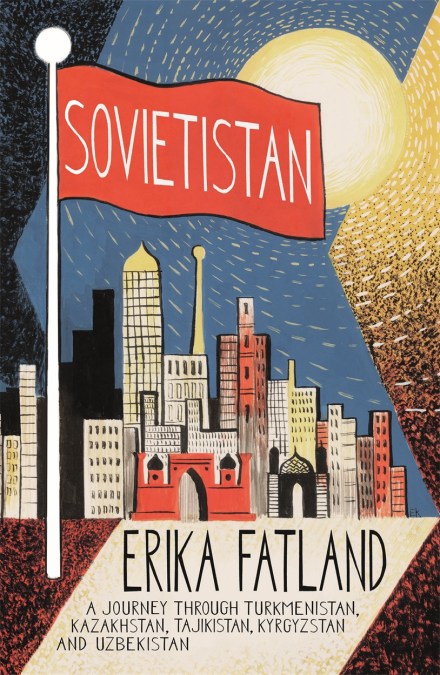Sovietistan
On sale
29th August 2019
Price: £20
Genre
Erika Fatland takes the reader on a journey that is unknown to even the most seasoned globetrotter. The five former Soviet Republics’ Kazakhstan, Kyrgyzstan, Tajikistan, Turkmenistan and Uzbekistan all became independent when the Soviet Union fell apart in 1991. How have these countries developed since then?
In the Kyrgyzstani villages Erika Fatland meets victims of the widely known tradition of bride snatching; she visits the huge and desolate Polygon in Kazakhstan where the Soviet Union tested explosions of nuclear bombs; she meets Chinese shrimp gatherers on the banks of the dried out Aral Sea and she witnesses the fall of a dictator. She travels incognito through Turkmenistan, a country that is closed to journalists. She meets exhausted human rights activists in Kazakhstan, survivors from the massacre in Osh in 2010, German Menonites that found paradise on the Kyrgyzstani plains 200 years ago. During her travels, she observes how ancient customs clash with gas production and she witnesses the underlying conflicts between ethnic Russians and the majority in a country that is slowly building its future in Nationalist colours.
In these countries, that used to be the furthest border of the Soviet Union, life follows another pace of time. Amidst the treasures of Samarkand and the bleakness of Soviet architecture, Erika Fatland moves with her openness towards the people and the landscapes around her. A rare and unforgettable travelogue.
Translated from the Norwegian by Kari Dickson
In the Kyrgyzstani villages Erika Fatland meets victims of the widely known tradition of bride snatching; she visits the huge and desolate Polygon in Kazakhstan where the Soviet Union tested explosions of nuclear bombs; she meets Chinese shrimp gatherers on the banks of the dried out Aral Sea and she witnesses the fall of a dictator. She travels incognito through Turkmenistan, a country that is closed to journalists. She meets exhausted human rights activists in Kazakhstan, survivors from the massacre in Osh in 2010, German Menonites that found paradise on the Kyrgyzstani plains 200 years ago. During her travels, she observes how ancient customs clash with gas production and she witnesses the underlying conflicts between ethnic Russians and the majority in a country that is slowly building its future in Nationalist colours.
In these countries, that used to be the furthest border of the Soviet Union, life follows another pace of time. Amidst the treasures of Samarkand and the bleakness of Soviet architecture, Erika Fatland moves with her openness towards the people and the landscapes around her. A rare and unforgettable travelogue.
Translated from the Norwegian by Kari Dickson
Newsletter Signup
By clicking ‘Sign Up,’ I acknowledge that I have read and agree to Hachette Book Group’s Privacy Policy and Terms of Use
Reviews
With her acute journalistic eye, clarity of style and not least a solid background in social anthropology, Erika Fatland has given us a number of astute books on complicated subjects. When this ability is combined with courage and a sense of adventure, the result is impressive
Even if you're not currently planning a trip to Central Asia, this book will change your mind
A road trip dotted with curious incidents, thought-provoking observations and absurd stories, from culinary disasters to snapshots of everyday life under a dictatorship. A fine mingling of facts and the observations of a true travel writer
Fatland really knows her subject and writes with conviction. After her thoughtful writing on Beslan and the massacre on Utøya, there was every reason to have huge expectations. They have been more than fulfilled.
With her acute journalistic eye, clarity of style and not least a solid background in social anthropology, Erika Fatland has given us a number of astute books on complicated subjects. When this ability is combined with courage and a sense of adventure, the result is impressive
Even if you're not currently planning a trip to Central Asia, this book will change your mind
A road trip dotted with curious incidents, thought-provoking observations and absurd stories, from culinary disasters to snapshots of everyday life under a dictatorship. A fine mingling of facts and the observations of a true travel writer
Fatland really knows her subject and writes with conviction. After her thoughtful writing on Beslan and the massacre on Utøya, there was every reason to have huge expectations. They have been more than fulfilled.
This talented narrator has compiled a book of timeless stories. Social anthropologist Erika Fatland has intertwined her encounters with well-researched digressions in history, politics and geography.
In Sovietistan, Erika Fatland has created a dense, polyphonic mosaic that shows five young states at the crossroads
Now to be numbered among the best travel writers, the brilliant and intrepid Norwegian Erika Fatland has observed deserts, villages, metropolises and mountains to bring back a jewel of a story of adventure, intermingled histories, geography, geology, culture and politics.
This is another Asia visited by the Norwegian Erika Fatland . . . countries of contrasts, of extreme wealth and the madness of dictators who build white marble cities in the desert
[A] mesmerising trip across central Asia . . . All credit to Erika Fatland, who may have titled her central Asian travelogue Sovietistan, but who treats each with care and attention. Part diary, part sociopolitical analysis . . . A fascinating travelogue
Engaging . . . The reader learns a lot about all kinds of subjects.
Reminiscent of Ryszard Kapuscinski's The Shadow of the Sun, Sovietistan blends complex history with Fatland's own clear-eyed reporting, the devastation of the Soviet era always in the background (and sometimes the foreground)
An introduction to a deeply misunderstood part of the world...the complexity and beauty of this region are best represented when she goes back in time. Fatland has a level of access most outsiders would never have.

